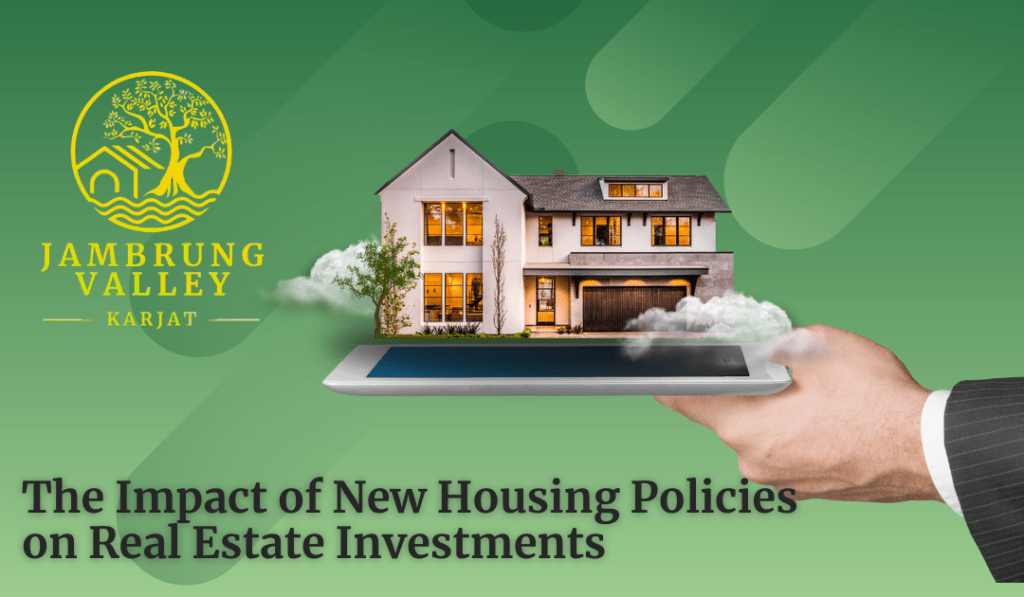
The Impact of New Housing Policies on Real Estate Investments
The real estate sector has long been a cornerstone of economic growth, providing opportunities for both individual investors and large-scale developers. However, recent changes in housing policies across the globe are reshaping the dynamics of this critical industry. These policy adjustments not only influence property prices but also alter investment strategies and market stability. In this article, we delve into the transformative effects of new housing policies on real estate investments and explore how investors can navigate these changes effectively.
Understanding the Shift in Housing Policies
Affordable Housing Mandates
- Governments worldwide are emphasizing affordable housing initiatives to address the housing crisis. Policies that incentivize developers to include affordable units in their projects have become common. While this ensures equitable housing access, it also affects profit margins for developers, making real estate investments in certain regions less attractive.
- Investors must evaluate markets where affordable housing policies are either lenient or supplemented by government subsidies, as these areas often present untapped potential for growth.
Zoning Law Revisions
- Changes in zoning laws are significantly impacting land use and urban planning. Governments are relaxing zoning restrictions to encourage mixed-use developments and densification in urban areas. For investors, this translates into opportunities in multi-functional properties that integrate residential, commercial, and recreational spaces.
- However, navigating these changes requires a deep understanding of local zoning amendments to identify properties with the highest appreciation potential.
Economic Impacts on Real Estate Investments
Property Tax Reforms
- Recent reforms in property taxation have been a double-edged sword for real estate investments. While lower tax rates can stimulate property transactions, heightened taxes in certain regions can deter buyers and reduce investment attractiveness.
- Investors should consider jurisdictions with favorable tax policies, ensuring a healthy balance between return on investment (ROI) and compliance costs.
Interest Rate Fluctuations
Housing policies often intersect with monetary policies, affecting interest rates for mortgages. Higher interest rates can dampen the real estate market by increasing borrowing costs, whereas lower rates encourage property purchases. Investors must stay abreast of interest rate trends, as these heavily influence the overall profitability of real estate ventures.
Environmental Regulations and Their Influence
Sustainability Standards
- Environmental concerns are driving stricter regulations in the real estate sector. Developers are now required to adhere to sustainability standards, including green building certifications and energy-efficient designs. While these measures contribute to long-term savings, they also increase initial project costs.
- For investors, properties that meet or exceed these environmental standards tend to command higher market value and attract eco-conscious buyers, making them a worthwhile investment.
Urban Green Spaces
Many governments are prioritizing urban green spaces in housing developments. Policies mandating a certain percentage of open spaces or landscaped areas in projects influence land utilization and construction costs. Investors should seek projects that harmonize with these regulations while maintaining profitability.
Socioeconomic Considerations in Real Estate
Demographic Shifts
Housing policies often reflect demographic trends such as urbanization, aging populations, and increasing single-person households. Policies favoring compact, affordable units cater to these changes and open up new avenues for real estate investments.
Technological Innovations and Policy Impacts
Smart Cities and Infrastructure Development
- Governments are increasingly focusing on smart city initiatives, incorporating advanced technology into urban planning. Housing policies aligned with smart city developments offer unparalleled investment opportunities in tech-enabled infrastructure.
- Investors can leverage these advancements by targeting properties in regions slated for smart city projects, ensuring long-term capital appreciation.
Digitalization of Real Estate Transactions
Policies promoting digital platforms for real estate transactions enhance market transparency and reduce fraud. For investors, this means easier access to accurate market data, enabling informed decision-making.
Navigating Risks in the Evolving Real Estate Landscape
Policy Volatility
Frequent changes in housing policies can create uncertainty in the real estate market. Investors should adopt a diversified portfolio to mitigate risks associated with policy fluctuations.
Market Saturation
In regions where housing policies encourage excessive development, oversupply can lead to market saturation. Conducting thorough market research and choosing investments in high-demand areas can help mitigate this risk.
Jambrung Valley: A Prime Investment Opportunity
Amid these shifting housing policies, certain regions stand out for their resilience and growth potential. Jambrung Valley, nestled within the scenic landscapes of Karjat, offers a unique blend of natural beauty, modern amenities, and favorable real estate policies. This emerging hotspot is ideal for investors seeking long-term value, as its development aligns with sustainable practices and urban expansion trends.
Explore the unmatched potential of Jambrung Valley and secure your place in a thriving real estate market today.



